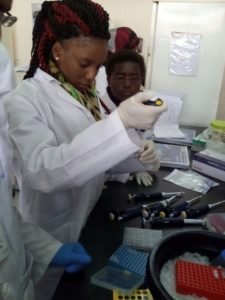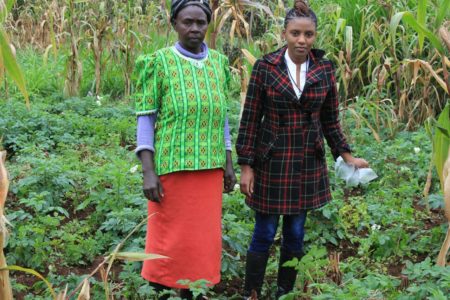“Women in time to come, will do great things”, said Mary Ward, an Englishwoman who lived in the late 16th and early 17th Centuries. Mary refused to be limited by boundaries of time and culture and worked towards the realization of her belief. And true to her word, here we are, celebrating thousands of women who are flourishing in this day and age.
On the occasion of International Day of Women and Girls in science—February 11—we share the story of Ms Ethel Webi, an upcoming researcher at the International Potato Center (CIP), based in Nairobi, Kenya. Together with colleagues, the young scientist is currently working on finding a solution towards bacterial wilt disease affecting potato, in a bid to enhance food security. This disease can cause total loss of a crop and prevent the use of land for potato production for several years.
Ethel, holds a BSc in Genomics and an MSc in Biology and Bioinformatics from Jomo Kenyatta University of Agriculture and Technology (JKUAT) in Kenya.

“I have always loved science because it’s challenging and I love to take up challenges!” She remarked when questioned on why she chose it as her career. She dates her love for Science and Technology to her final year in secondary school where she first encountered genetics in a Biology class, sparking her lifetime fondness for the discipline.
In the year 2013, Ethel joined The Kenya Medical Research Institute (KEMRI) as an intern carrying out research on early infant HIV diagnosis for a year. The project entailed counting CD4 cells in children to measure the rate at which HIV cells grow. She went on to join CIP in 2015 as a student while working on her masters’ project “The Late Blight Project” which focused on potato blight. A Ksh. 200,000 (USD 2000) grant she received from Japan International Cooperation Agency (JICA) facilitated her research for the topic.
“The money I received made it possible for me to collect samples from the field, isolate pathogens and carry out molecular characterization making the project a success”, Ethel explained.
Ethel is a vocal advocate for women joining disciplines entailing Science and Technology and is elated that there is a day set aside to celebrate women in the field. She was particularly excited that more women and girls are joining the Biotechnology field.
She asserted that being empathetic and eager to help the society is a trait that women possess, making science the ideal career path for her. “Science is interesting and offers solutions to everyday problems. It’s applicable in every situation and changes lives”.

The upcoming scientist enjoys working at CIP because she has the rare opportunity to apply what she has studied and is immensely grateful, since most individuals who study science lack employment opportunities and end up in unrelated fields. “The laboratories and equipment here are state of the art with the best facilities which gives me an opportunity to keep learning more and improve my research”, explained Ethel. When questioned about her most extraordinary moments at CIP, she mentioned being able to meet individuals from different countries and localities and learning new things when working on her research projects.
The journey to her academic excellence has been no bed of roses as she expressed several challenges she has encountered over the years. Ethel stressed on the difficulty she faced when trying to find a project for her Masters due to limited options for science students. She also mentioned the negative mind frame of the society towards Genetically Modified Organisms (GMOs), making it difficult for her to connect with the society who could benefit from them. “The government is also hesitant in addressing the issue of food security in the country, which is an issue that needs to be sorted out”.
She hopes to pursue a PhD in Molecular Biology especially Biotechnology and continue working with plants because the products she is developing at CIP aid in ensuring food security.
Story by Doris Diane Odhiambo, Communications Intern-CIP SSA
